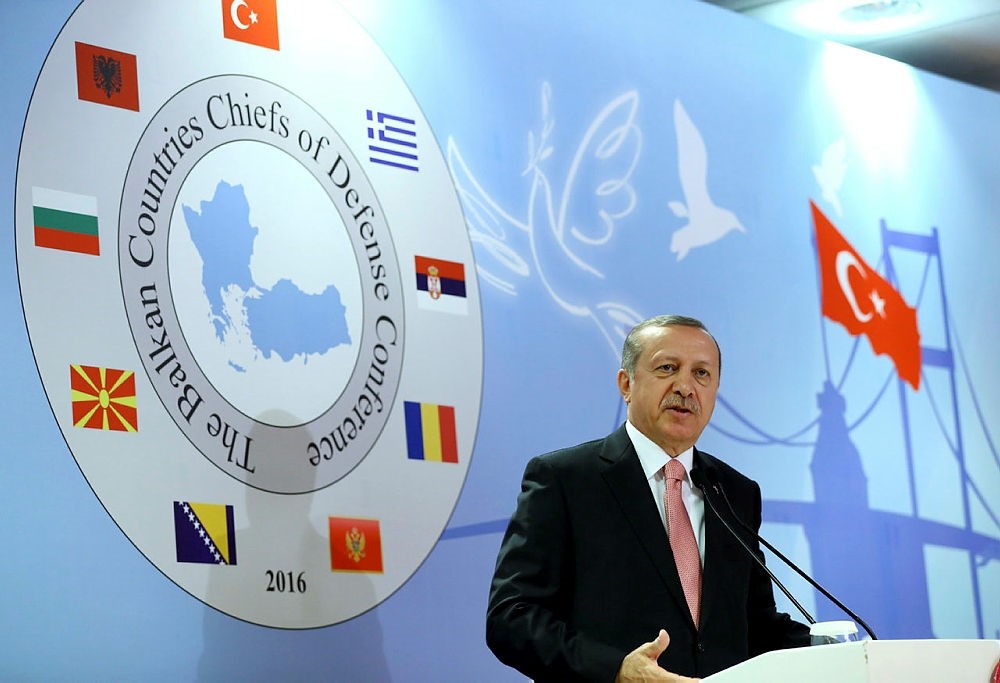
Turkey's development projects, soft power activities and growing economic operations in the Balkans, especially over the past 15 years, have sounded alarm bells in some European capitals as Turkish influence has led to one-sided verbal skirmishes from time to time.
Ankara has sought ways to implement a multi-dimensional and global foreign policy for years, and the Balkans have been dominating the Turkish government's agenda.
Striving to introduce "the new Turkey" to Balkan countries while not entirely cutting off the historic relationship stemming from the times when the Ottoman Empire ruled the region for more than 500 years, Ankara has turned the tide, some experts argue.
"Turkey has upped its frequency of appearance in the Balkans by using soft-power instruments more effectively since the beginning of the 2000s, which led to a positive shift in the perception of Turkey," Mehmet Uğur Ekinci, an expert on the Balkans, said in his report for the Political, Economic and Social Research Foundation (SETA).
That being said, Ekinci believes that there is still a considerable amount of distrust and animosity toward the country, which is spearheaded by extremist groups due to historic events.
Nedim Emin, an expert on the Balkans and a Ph.D. candidate at Sakarya University, agrees. Pointing to Turkey's activities in the Balkans since the start of the 21st century, Emin said, "In this period, a higher level of self-confidence and dynamism, especially the diversification of public institutions, including new diplomatic missions, made a significant contribution to Turkey's presence and appearance in the region."
Turkey's growing economy has helped Ankara exert influence in the Balkans. As the Turkish economy grew at an overwhelming pace of around 5 percent since the Justice and Development Party (AK Party) gripped power in 2002, trade ties with Balkan countries increased correspondingly.
"According to data from TurkStat [Turkish Statistical Institute], the trade volume with 11 countries in the Balkans in 2016 is about four times higher than in 2002, rising from 3.66 billion euros to 13.4 billion euros," Emin said, citing various reasons such as Turkey's proximity to the Balkans and the relatively poor state of the regions agriculture.
Ankara's development aid and soft-power projects have benefited from the gradually prospering Turkish economy.
"According to OECD [Organization for Economic Co-operation and Development] data, Turkey provided official development aid to Western Balkan countries in 2015 worth $154.6 million. This sum is the highest in the history of Turkey to these countries," Ekinci said in the SETA report.
Emin emphasized the lavish development aid to the Balkans as well, stressing that it was only around $2.5 million in 2003.
TURKEY: THE FORMIDABLE FOE IN THE BALKANS
Turkey's ambitions in the Balkans have not gone unnoticed. Some European capitals have been irked by Turkey's growing clout.
"The importance of the EU in the Balkans has disappeared. To the contrary, Turkey and Saudi Arabia are building their own sphere of influence," Austrian Defense Minister Hans-Peter Doskozil said in late June.
Furthermore, "Austria has observed creeping Islamization in the Balkans," Doskozil said.
Austrian Foreign Minister Sebastian Kurz, who is known for his staunch anti-Turkey stance, has recently spoken of a similar concern. In Sarajevo or Pristina, for example, "women are paid to go to the street in full veil to change the street image," Kurz told the Handelsblatt newspaper in late August.
"Here we cannot stand idly," he said.
Kurz is likley to be the next Austrian chancellor in October.
Vienna is not alone in its attempts to not let its influence slip in the Balkans. A high level Balkan diplomat recently told Daily Sabah that Berlin has also been quite irritated by Turkey's activities.
The senior diplomat contended that German nongovernmental organizations go from door to door in some Balkan countries in what is seen as a soft-power war.
Emin argues that the Balkans play a crucial role due to its geo-political and geo-strategic position.
"We must read it as a remarkable development in this respect that the reason why Turkey's influence in the Balkans has been targeted is due to the disagreements that have occurred with some EU countries in recent years," Emin said.
However, he believes that the Austria and Germany's efforts will fail.
"It is possible for Austria and Germany to warn the Balkan countries about Turkey, but it is difficult to convince them," Emin said.
The media is also in the equation. Ekinci claims in his report that media outlets owned by Germans or the Americans produce distorted or perception-shifting stories about Turkey. "The fact that media outlets in the Balkans cover events in a European and U.S.-oriented way or a nationalist populist way increases the frequency of distorted news about Turkey," he said.
The high level diplomat from a Balkan country stressed that newspapers and television channels under the influence of Germany divert attention as they please and shift perception in society.
A news story in the Belgrade-based newspaper Vecernje Novosti, for instance, claimed in April that Ankara was masterminding a project to form "the Great Albania." The news was seen as absurd in Turkey, which President Recep Tayyip Erdoğan rebuffed later on, saying that Ankara would not even ponder over such a thing.
Despite the ongoing squabbles in the Balkans, Emin suggests that "the Turks and other Muslim elements that are familiar with Turkey in the Balkans welcome the increasing influence of Turkey in the region."
Emin said that Ankara's economic initiatives contribute to Turkey's growing positive image.
"Both Balkan societies and regional politicians view Turkey as an employment gateway that is able to make investments and productions in the Balkans. This is the most important element of Turkey's soft power," he said.
